Aspirin’s role in dermatology has been explored in a 2015 review. It mentions that oral aspirin may help reduce inflammation in some skin conditions1. This anti-inflammatory property has sparked interest in aspirin as a potential acne treatment.
Aspirin is a common over-the-counter medication known for reducing inflammation. Many wonder if it could effectively tackle stubborn breakouts. Let’s explore if aspirin can truly help in the battle against acne.
Acne comes in two main forms: noninflammatory and inflammatory. Noninflammatory acne causes minor blemishes like blackheads and whiteheads. Inflammatory acne creates red, swollen, and often painful lesions such as pustules, nodules, or cysts.
Aspirin might help with inflammatory acne due to its inflammation-reducing abilities1. However, no direct studies have looked into aspirin’s effectiveness in treating acne1. This lack of research creates uncertainty about its true benefits.
The American Academy of Dermatology (AAD) notes limited clinical trials on aspirin for acne treatment. This highlights a gap in significant scientific evidence2. Despite this, many still consider using aspirin as a home remedy for their breakouts.
We’ll explore the link between aspirin and acne, examining available scientific evidence. We’ll also discuss whether aspirin is a viable option for those seeking clearer skin. Let’s uncover the truth about aspirin’s potential in acne treatment!
Key Takeaways
- Aspirin has anti-inflammatory properties that may potentially help reduce inflammation associated with acne.
- There is limited scientific evidence supporting the effectiveness of aspirin for acne treatment.
- Topical application of aspirin may cause side effects such as skin dryness, irritation, peeling, and redness.
- Over-the-counter acne medications containing ingredients like retinoids, benzoyl peroxide, and salicylic acid are more proven treatments.
- Severe acne cases may require prescription treatments like birth control pills, oral or topical antibiotics, or isotretinoin.
Looking for the best beauty product reviews? We’ve got you covered. Check out our top picks for foundation, anti-aging creams, and hair care. We also review vegan beauty products, skincare routines, and makeup tools.
Don’t miss our recommendations for nail care, cruelty-free makeup, and beauty blenders. Visit us often for the latest in beauty supply reviews and tips!
Understanding Aspirin and Its Properties
Aspirin is a common medication found in many households. This drug has potential uses beyond pain relief, including treating acne. Let’s explore aspirin’s nature and its anti-inflammatory properties.
What is Aspirin?
Aspirin, or acetylsalicylic acid, is a nonsteroidal anti-inflammatory drug (NSAID). It’s used to reduce pain, fever, and inflammation3. Aspirin belongs to the salicylate family, which includes salicylic acid, a popular acne treatment ingredient3.
Although related, aspirin and salicylic acid are different substances3. Each has unique properties and uses in medicine and skincare.
How Aspirin Works as an Anti-Inflammatory
Aspirin’s anti-inflammatory properties are crucial in potentially treating acne. When taken orally, it blocks prostaglandin production, which causes inflammation, pain, and fever4. This action may help reduce redness and swelling in inflammatory acne lesions3.
Some people use crushed aspirin as a topical acne spot treatment3. The idea is that its anti-inflammatory properties may shrink breakouts when applied to skin3. However, scientific evidence for this use is limited3.
The first recorded use of willow bark, a natural source of salicylic acid, dates back to 1763. Edward Stone published findings on its success in treating agues4.
Stay tuned for more insights on aspirin and acne-prone skin. We’ll keep exploring this topic and many others. Check back for reviews on various beauty supplies.
We cover everything from acrylic nails to hair growth serums. Our reviews include nail polish removers, hair color kits, and skincare routines. We also explore moisturizers, vegan beauty products, and cruelty-free makeup.
The Connection Between Aspirin and Acne
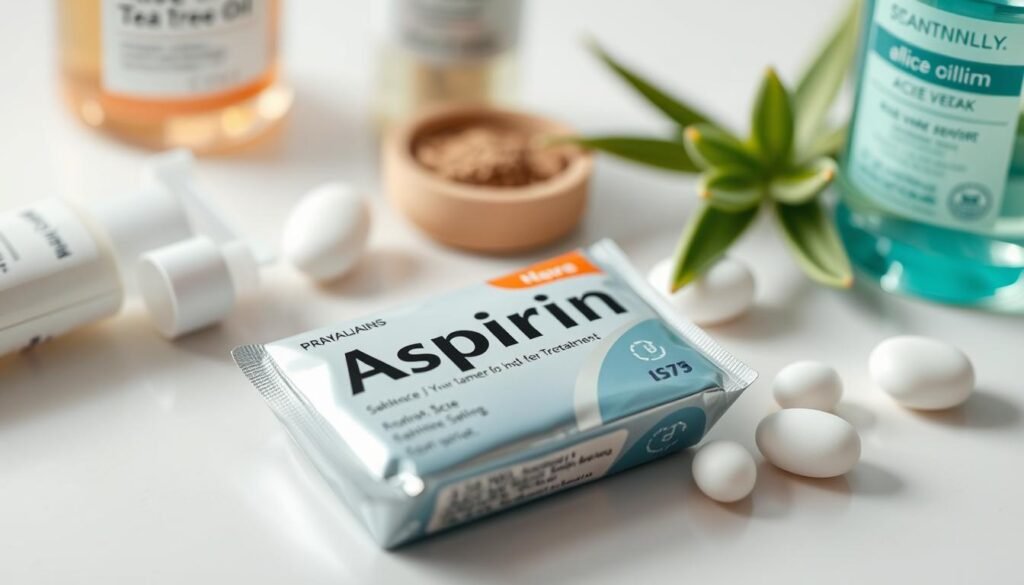
Acne affects millions worldwide, making effective treatment crucial. Some people turn to aspirin as a potential solution for their breakouts. Let’s explore the link between aspirin and acne.
Inflammation and Acne Development
Inflammation plays a key role in acne formation. Clogged pores trigger an immune response, causing redness, swelling, and pain. This can lead to more severe acne forms like pustules and cysts.
Salicylic acid, found in many acne products, helps clear skin. Aspirin’s active ingredient, acetylsalicylic acid, must break down to release salicylic acid5.
Aspirin’s Potential Role in Treating Acne
Aspirin, a nonsteroidal anti-inflammatory drug, may help with inflammation when applied topically. However, it’s not effective for non-inflammatory acne like blackheads and whiteheads5.
Some people with hormonal, cystic acne report success using 81mg to 162mg doses of aspirin. They claim acne reduction starts almost immediately after beginning the regimen6.
One user reported taking 1-2 baby aspirins daily, nearly eliminating their acne. Another found success combining low-dose antibiotics with aspirin, seeing improvement in 4-5 days6.
I started taking a higher dose of aspirin (162mg) and noticed an effective reduction in acne, preventing new spots from forming. I’m considering discontinuing my antibiotic use in favor of aspirin treatment for my acne6.
Some dermatologists use aspirin as an anti-inflammatory agent when other treatments aren’t available. However, there’s no solid evidence supporting aspirin for acne treatment5.
Salicylic acid is preferred over acetylsalicylic acid for acne. Products like Murad Rapid Relief Acne Spot Treatment contain recommended amounts5.
Before using aspirin for acne, patch test on a small area. Apply aspirin paste 2-3 times weekly at most. Avoid combining with other acne treatments to prevent irritation5.
Always consult a dermatologist before trying new acne treatments. They can provide personalized recommendations based on your skin type and acne severity. Remember, what works for one person may not work for another.
Visit us for reviews on beauty supplies, including vegan makeup removers, UV nail lamps, and sulfate-free shampoos. We also cover facial cleansers, organic lotions, natural deodorants, and mineral sunscreens.
Scientific Evidence on Aspirin for Acne Treatment
Aspirin has gained popularity as a natural acne remedy. However, scientific evidence supporting its effectiveness is limited. Its anti-inflammatory properties could potentially reduce acne severity.
Research specifically focusing on aspirin as an acne medication is scarce. More studies are needed to determine its effectiveness and safety.
Limited Research on Topical Aspirin for Acne
A 2015 review noted oral aspirin helped reduce inflammation in several skin conditions. However, it didn’t specifically look at acne. An older study found topical aspirin reduced skin inflammation from allergic reactions.
Some find aspirin helpful for reducing inflammation in larger pimples. But it can irritate the skin. Dermatologists suggest using established acne treatments instead.
Dermatologists suggest sticking to established acne treatment ingredients such as retinoids, benzoyl peroxide, and salicylic acid instead of using aspirin masks7.
Studies on Aspirin’s Effects on Other Skin Conditions
Studies have explored aspirin’s potential benefits for other skin conditions. Research shows it may help alleviate symptoms of psoriasis and rosacea. However, these findings can’t be directly applied to acne treatment.
Over-the-counter acne remedies may not provide immediate results. Consistency and patience are key when using any acne treatment. Natural remedies like tea tree oil and honey have anti-inflammatory properties.
For stubborn cases, consider products with proven ingredients. Salicylic acid, benzoyl peroxide, or sulphur may yield better results than aspirin alone.
Check back often for the best reviews on beauty supplies. We cover foundations for oily skin, vegan products, skincare routines, and more.
Is Aspirin Good for Acne Treatment?
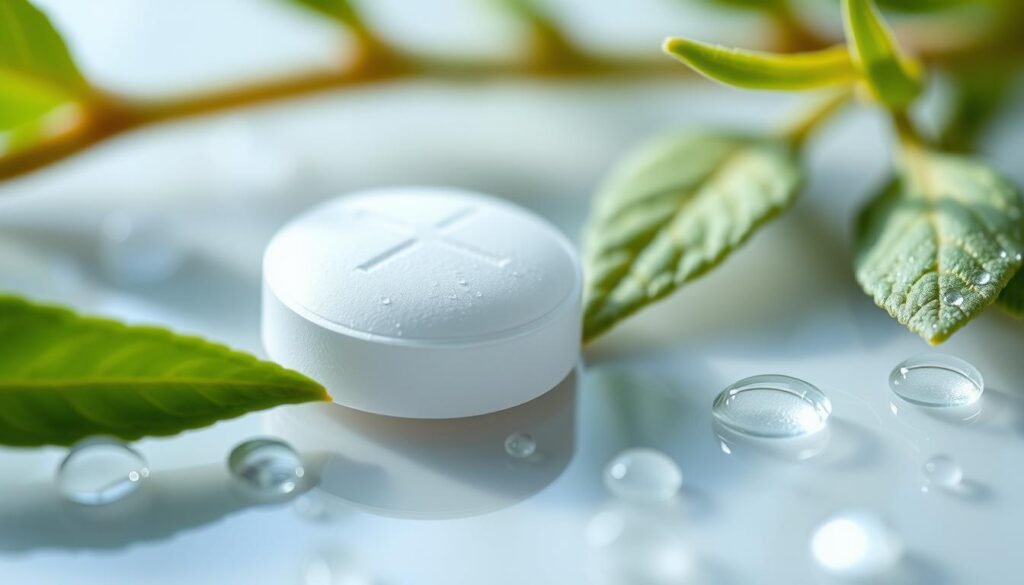
Aspirin is often suggested as a natural acne remedy. However, there’s no solid proof that it works for acne when applied to skin. Its anti-inflammatory properties might seem helpful, but research doesn’t back this up.
Some people say aspirin helps reduce inflammation and shrink pimples. But the amount of salicylic acid in aspirin tablets varies. This can lead to unpredictable results when using it for acne.
Instead, try proven acne treatments like salicylic acid. The Pink Foundry’s Clearing & Calming Acne Face Wash has 1.5% Salicylic Acid. It exfoliates skin and prevents breakouts8.
Benzoyl peroxide is another good option. TULA SKINCARE Go Away Acne Spot Treatment contains 5% benzoyl peroxide9. Topical retinoids, like SUNDAY RILEY A+ High-Dose Retinoid Serum, can also help98.
Always consult a doctor or dermatologist before applying aspirin on acne, especially if using other topicals or have underlying health conditions.
Tea tree oil and Niacinamide are effective acne-fighting ingredients. The Pink Foundry’s Acne Care & Healing Gel Moisturiser contains both8. Vitamin C can also benefit acne-prone skin. Try MY SKINNY MASK Turmeric and Vitamin C Clay Mask9.
Aspirin might seem cheap, but its effectiveness is questionable. If you’re on a budget, stick to proven treatments. Give them time to work for the best results.
Check back often for the best reviews on beauty supplies. We cover anti-aging creams, cruelty-free makeup, beauty blenders, and more. Find the best products for your skin and hair care needs.
Alternative Acne Treatments to Consider
Several evidence-backed acne treatments offer effective alternatives to aspirin. These options have been extensively studied for managing various types of acne. Let’s explore some proven methods for tackling mild to severe cases.
Topical Retinoids and Benzoyl Peroxide
Topical retinoids, derived from vitamin A, regulate cell turnover and reduce inflammation. They’re often used as a first-line treatment for mild to moderate acne. Benzoyl peroxide, another popular option, has antimicrobial properties and unclogs pores.
It’s available in various strengths, suitable for different skin types and acne severities. Both treatments effectively combat acne by addressing multiple factors contributing to breakouts.
Oral Antibiotics and Contraceptives
Oral antibiotics may be prescribed for moderate to severe acne cases. They help control acne-causing bacteria growth and reduce inflammation. For women, oral contraceptives can regulate hormones and minimize acne breakouts.
However, it’s crucial to consult a healthcare professional before starting any oral medications. They can determine if these options are appropriate for your specific situation.
Salicylic Acid and Azelaic Acid
Salicylic acid, a beta-hydroxy acid, is found in many over-the-counter acne treatments. It exfoliates skin, unclogs pores, and reduces inflammation10. You can find it in cleansers, toners, and spot treatments.
Azelaic acid calms lesions, reduces hyperpigmentation, and fights acne-causing bacteria11. It’s often well-tolerated by those with sensitive skin. You can find it in prescription and over-the-counter formulations.
Acne management is unique to each person. Factors like skin type and acne severity influence the best treatment approach. Consult a dermatology provider to develop a personalized plan addressing your specific needs.
Explore these alternative acne treatments to improve your skin’s appearance and health. Check back for reviews on beauty supplies, including anti-aging serums and oil-free sunscreens.
We also cover makeup primers, waterproof mascaras, natural face toners, and chemical peel kits. Find info on makeup setting sprays, natural deodorants, cruelty-free makeup removers, and tinted lip balms.
Discover the best hydrating face masks and Korean skincare products. Our comprehensive reviews help you make informed decisions about your skincare routine.
FAQ
How does aspirin work as an anti-inflammatory?
Is aspirin the same as salicylic acid, a common acne treatment ingredient?
Can aspirin treat all types of acne?
Is there scientific evidence supporting the use of topical aspirin for acne treatment?
Should I use aspirin as a natural remedy for my acne?
What are some alternative acne treatments to consider instead of aspirin?
Source Links
- Aspirin for acne: Does it work and how to use it – https://www.medicalnewstoday.com/articles/aspirin-for-acne
- Can Aspirin Treat Acne? – https://www.healthline.com/health/aspirin-for-acne
- Does aspirin for acne really work? | Curology – https://curology.com/blog/does-aspirin-for-acne-really-work/
- Aspirin in dermatology: Revisited – https://www.ncbi.nlm.nih.gov/pmc/articles/PMC4693360/
- Aspirin for Acne: Helpful Hack or Internet Hoax? – https://www.byrdie.com/aspirin-for-acne-5084139
- No title found – https://www.acne.org/forums/3-over-the-counter-acne-medications-and-products/362417-baby-aspirin-cured-my-cystic-acne-oral-not-a-mask
- Dermatologists Weigh In On The Acne Home Remedies We’ve All Tried – https://www.huffpost.com/entry/acne-home-remedies-dermatologists_l_648cc179e4b025003ee4586c
- The Truth Behind Using Aspirin for Pimples: Does It Really Work? – https://www.thepinkfoundry.com/blogs/news/aspirin-for-pimples?srsltid=AfmBOopaiwN5urMaoeWsh2v44ZNBRZunDuhFsh7BEamx1hm7kYqmLAfA
- Aspirin for Acne: Does It Work? – https://www.ipsy.com/blog/aspirin-for-acne
- Acne Treatment Basics: Salicin Vs. Salicylic Acid | 100% PURE – https://www.100percentpure.com/blogs/feed/acne-treatment-basics-salicin-vs-salicylic-acid?srsltid=AfmBOoqhICqa7w0F6VkEGn-NaMErvlnGhXq180OI9FRj9EoLSnrml56a
- Cystic Acne Home Remedies: 7 Treatments to Try – https://www.healthline.com/health/cystic-acne-home-remedy

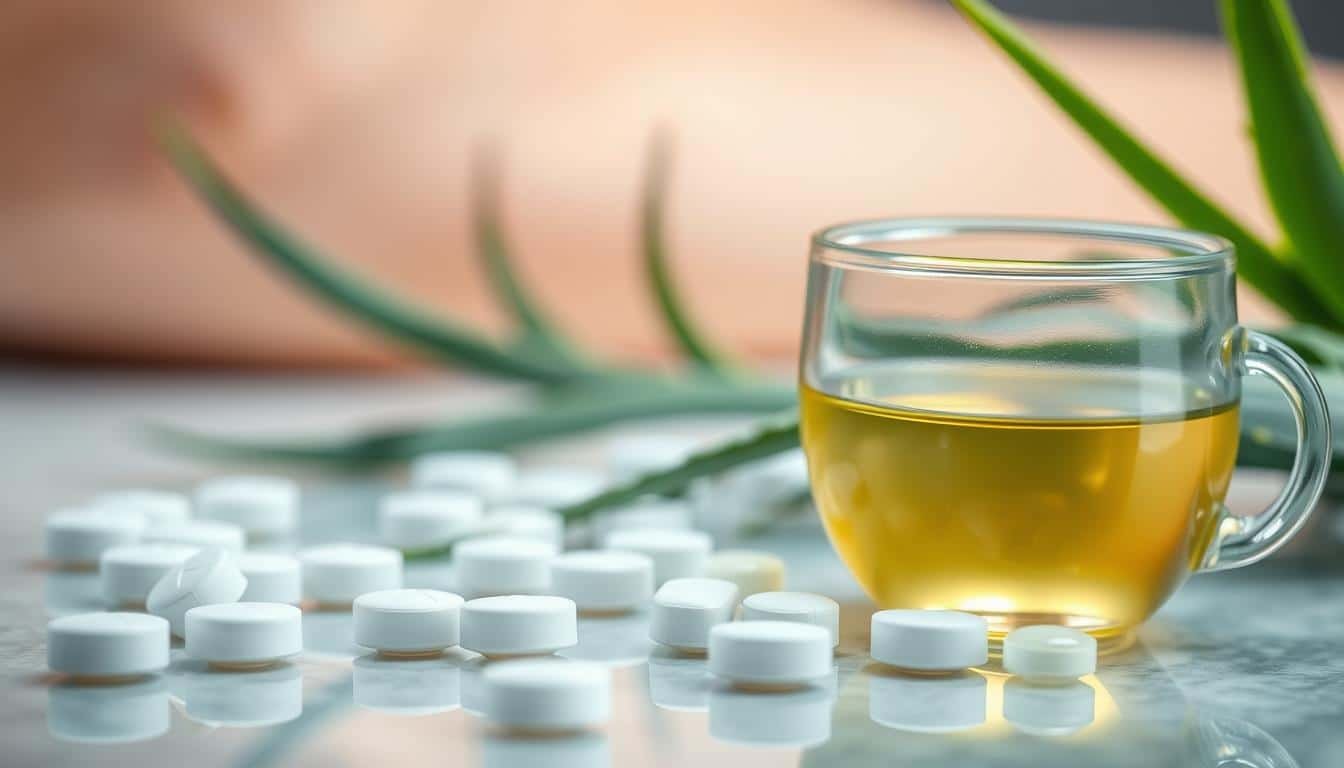
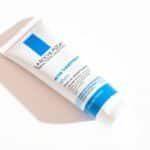
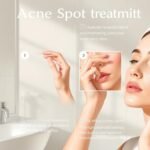

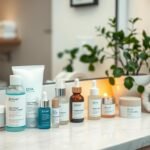
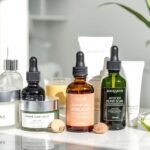

Interesting read, but isnt using aspirin on acne just like using duct tape to fix a leaky pipe? Just a thought!
Interesting read but isnt it high time we move past archaic methods like aspirin and focus on futuristic tech like laser treatment for acne?
Interesting read, but isnt it a bit dangerous to use aspirin this way without doctor supervision? Could it cause unknown side effects?
Is aspirin actually good for acne? Or is it just another cash grab from Big Pharma? Just food for thought, guys.
Interesting read but Im skeptical. Has anyone else tried aspirin for acne? Seems too simple to really work. Thoughts?
I wonder if the aspirins anti-inflammatory properties would work same on all skin types? Is it universally effective or a skin type gamble?
Universal? Highly doubtful. Everyones skin unique, like fingerprints. Do your own research!
Interesting article! But why pop a pill? Isnt it better to treat acne naturally or with topical applications, rather than internally?